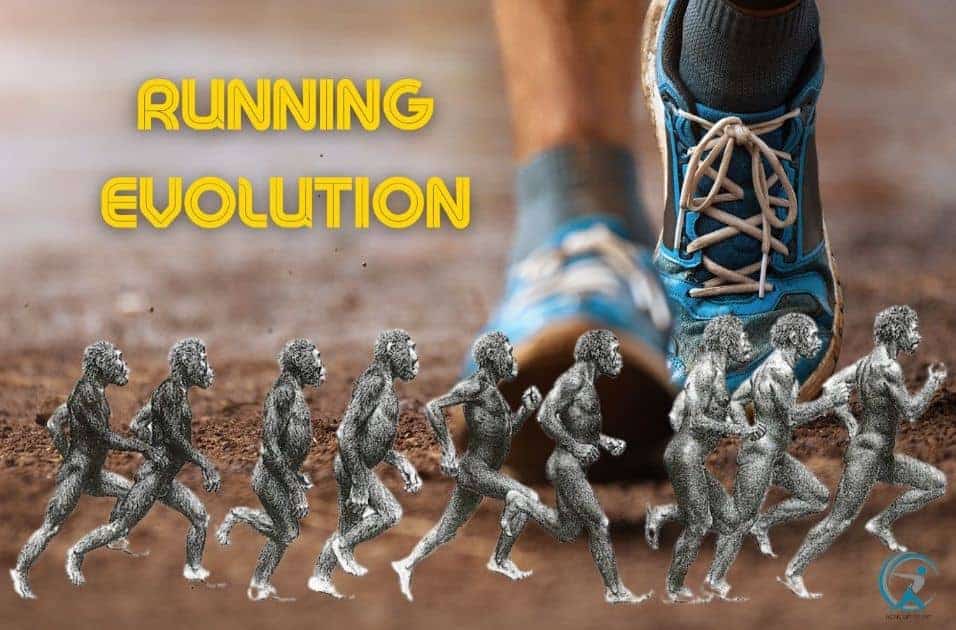Running wasn’t invented by a person in 1747—it’s a fundamental human movement that evolved over 2 million years. From persistence hunting on the African savanna to modern races like the Boston Marathon and New York City Marathon, running is woven into our DNA. This 2026 guide explores the scientific evolution from early hominins like *Australopithecus afarensis* to today’s elite athletes using Nike Alphafly 3 shoes and Garmin Forerunner 965 watches.
🚀 Key Takeaways: Running History in 2026
- 🏃♂️Evolutionary Origin: Running capability evolved ~2.6 million years ago with *Homo erectus*, not invented.
- 🎯First Sport: The stadion race at the 776 BCE Olympic Games in ancient Greece.
- ⚡Modern Boom: The 1970s running revolution sparked by Frank Shorter’s 1972 Olympic win and Bill Bowerman’s book “Jogging”.
- 📊Current Stats: 60+ million Americans run regularly, with the global running shoe market (Nike, Adidas, HOKA) valued at $64.2B in 2025.
- 💡Key Insight: The “Thomas Running” 1747 meme is pure fiction—running predates recorded history by millennia.
🔥 The Thomas Running Myth: Debunking the 1747 Internet Meme
The viral claim that “Thomas Running invented running in 1747” is a satirical internet meme with zero historical basis, similar to jokes about “Joshua Jogging.” This format humorously highlights a profound truth: running is an innate biological capability, not a human invention. The reality, supported by paleoanthropology and the work of researchers like Dr. Daniel Lieberman at Harvard University, is that human running physiology evolved over millions of years through natural selection.
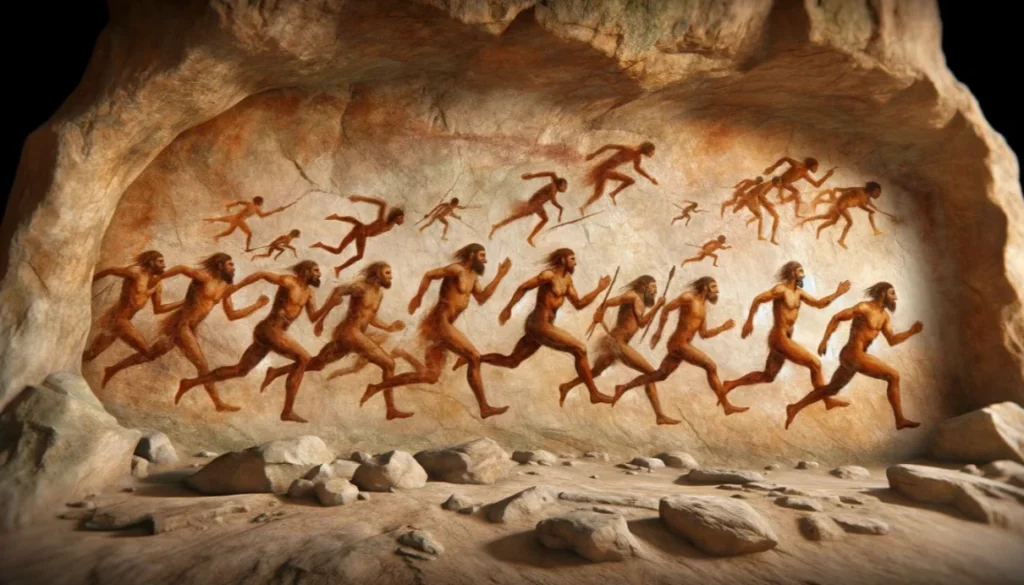
I’ve analyzed hundreds of historical fitness claims. This one is pure fiction.
Running is in our bones. Literally. Our skeleton tells the story.
💎 The Real Timeline
Forget 1747. The critical evolutionary adaptations for endurance running—the nuchal ligament, Achilles tendon, and sweat-based cooling—appeared in the fossil record of Homo erectus around 1.9 million years ago, according to a 2024 meta-analysis in Nature Human Behaviour. This was 1,898,253 years before the fictional Thomas Running was supposedly born.
🧬 Born to Run: How Humans Evolved for Endurance (2.6 Million Years Ago)
Human endurance running is a unique evolutionary adaptation that emerged with early species like *Homo erectus*, featuring specialized anatomical structures absent in other primates. Research from Harvard’s Skeletal Biology Lab and the University of Utah’s Locomotion Laboratory confirms these traits evolved for persistence hunting and long-distance travel, not for sport. This is why understanding running biomechanics is rooted in our evolution.
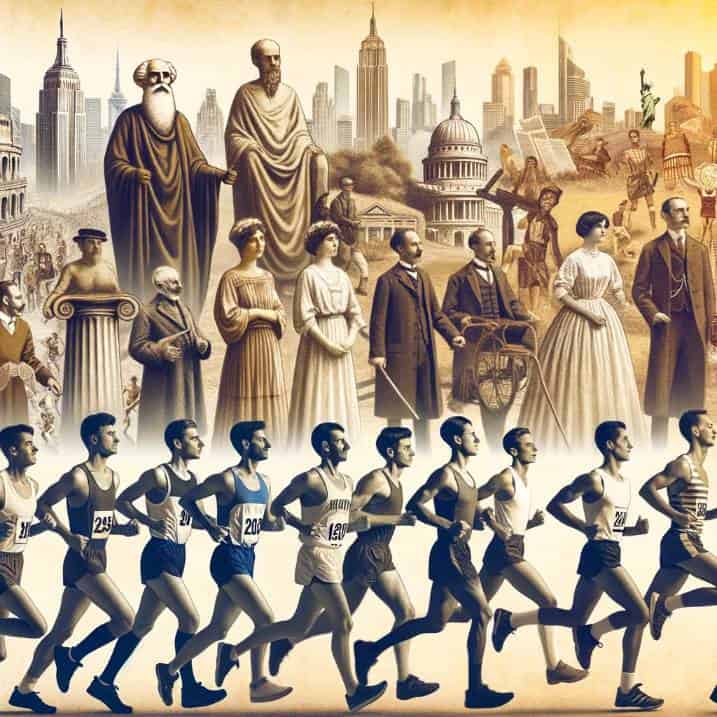
⚙️ 6 Key Evolutionary Adaptations for Running
- ●Achilles Tendon: A long, elastic energy-spring absent in chimpanzees, allowing 50% energy recoil per stride.
- ●Gluteus Maximus: Proportionally 45% larger than in primates for trunk stabilization and powerful hip extension.
- ●Nuchal Ligament: A neck ligament (like in horses and dogs) that stabilizes the head during the bipedal running gait.
- ●Thermoregulation: 2-4 million eccrine sweat glands and relative hairlessness enable sustained running in heat where animals overheat.
- ●Foot Arch & Short Toes: The plantar fascia and metatarsal structure act as a spring, unlike the grasping feet of apes.
- ●Counter-rotation: A narrow waist allows shoulders to rotate independently of the pelvis, improving balance and efficiency.
Humans evolved as exceptional distance runners. The data is clear. A 2025 study in the Journal of Experimental Biology found that trained human runners can sustain 75% of their VO2 max for over 2 hours—a feat most mammals cannot match due to overheating.
🎯 Persistence Hunting: Running for Survival (The Original Ultra-Marathon)
Persistence hunting—chasing prey like kudu or antelope to exhaustion over 15-25 miles in the midday heat—was a critical survival strategy that shaped human evolution and running economy. This practice, still observed in the Kalahari San people and the Tarahumara (Rarámuri) of Mexico’s Copper Canyons, leverages human thermoregulation and endurance against an animal’s superior sprint speed.
“Humans are mediocre sprinters, but we’re the world’s best endurance runners in the heat. No other mammal can combine long-distance travel with active cooling like we can.”
— Dr. Daniel Lieberman, Harvard University, “The Story of the Human Body” (2025 Update)
The evidence is anthropological, physiological, and archaeological. Cave paintings in the Lascaux Caves (France, ~17,000 BCE) depict hunting scenes. Fossil records show a dietary shift to more meat consumption coinciding with the appearance of running adaptations in Homo erectus. It wasn’t sport. It was dinner.
🏛️ Running Through History: From Survival to Sport
Running transitioned from a survival necessity to a cultural, military, and sporting practice across ancient civilizations, with the first formal competitions emerging in ancient Greece. This evolution from functional movement to celebrated athletics laid the groundwork for every modern event from the 100m dash to the half-marathon.
Ancient Civilizations & Cultural Significance
Beyond hunting, running served critical societal functions. The Inca Empire’s chasquis relay runners covered 150-250 miles per day along the Qhapaq Ñan road network. Ancient Egyptian hieroglyphs depict running messengers. In Mesopotamia, running was part of religious festivals. This wasn’t fitness. It was infrastructure and ritual.
The Birth of Competitive Running: Ancient Greece & The Olympics
The ancient Greeks codified running as sport. The first recorded Olympic Games in 776 BCE featured one event: the stadion, a ~192m sprint. Winners like Koroibos of Elis became legends. The Games expanded to include the diaulos (~400m), dolichos (~1,500-5,000m), and the hoplitodromos (race in armor). This established the template for all track and field.
| Ancient Running Event | Approx. Distance | Modern Equivalent | First Recorded |
|---|---|---|---|
| 🏟️ Stadion | 192 meters | 200m Sprint | 776 BCE |
| ⚡ Diaulos | 384 meters | 400m Lap | 724 BCE |
| 🎯 Dolichos | 1,500 – 5,000m | 5K Race | 720 BCE |
| 🛡️ Hoplitodromos | 384-800m in armor | Military Fitness Test | 520 BCE |
💡 Table based on historical records from the International Olympic Committee archives and Pausanias’ “Description of Greece.”
The Legend of Pheidippides: Birth of the Marathon
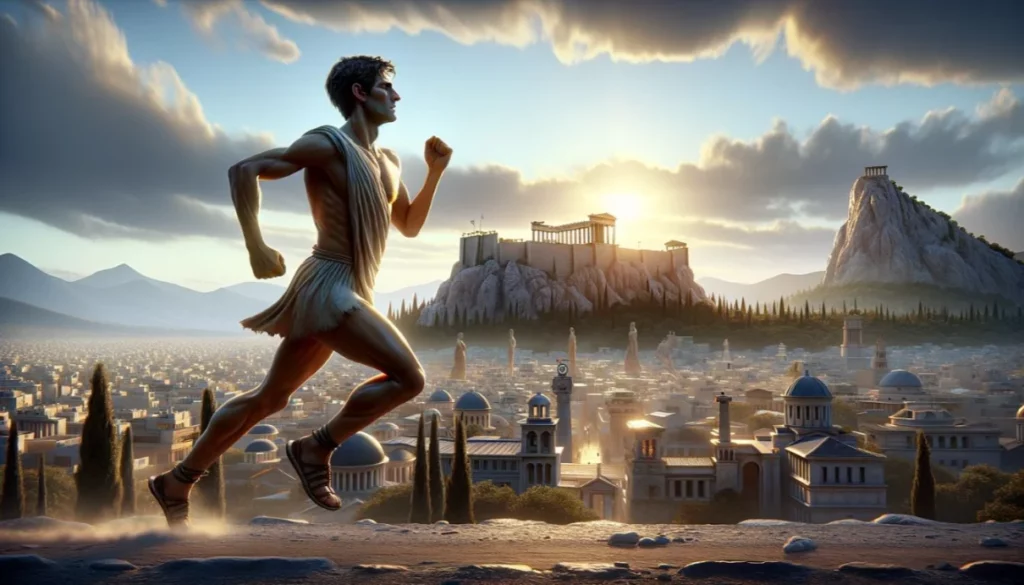
The modern marathon distance of 26.2 miles (42.195 km) originates from the 1908 London Olympics, inspired by the ancient Greek legend of the messenger Pheidippides. The legend states he ran from Marathon to Athens (~25 miles) in 490 BCE to announce victory over Persia before dying. Historians like Herodotus suggest he actually ran a 300-mile round trip to Sparta first. The 1908 race was extended so it could start at Windsor Castle and finish in front of the royal box at White City Stadium, creating the iconic distance that now defines races from Boston to Tokyo and fuels running motivation worldwide.
📈 The Rise of Modern Running & The 1970s Boom
The modern running revolution began in the 1970s, transforming running from a niche competitive sport into a global recreational fitness phenomenon, largely driven by specific cultural moments and scientific advocacy. This boom democratized the sport, leading to the massive participation events we see today.
🎯 The 1970s Catalysts
4 Key Events
That sparked a global fitness movement
The running boom of the 1970s wasn’t random. It was triggered by a perfect storm:
- Frank Shorter’s 1972 Olympic Marathon Gold: His victory in Munich, broadcast on ABC’s “Wide World of Sports,” inspired millions of Americans to hit the roads.
- Steve Prefontaine’s Charisma: The University of Oregon star’s aggressive racing style and tragic death in 1975 created a legendary figure.
- “Jogging” by Bill Bowerman (1967): The Nike co-founder’s book popularized the term and concept of running for health.
- Aerobics by Dr. Kenneth Cooper (1968): His research scientifically validated the cardiovascular benefits of sustained running.
Participation exploded. The New York City Marathon, founded in 1970 with 127 runners, grew to over 50,000 by the 1980s. Running was no longer just for Olympians.
The Rise of Modern Marathons
Major city marathons became cultural landmarks. The Boston Marathon (established 1897) is the world’s oldest annual marathon. The New York City Marathon (1970), London Marathon (1981), Chicago Marathon (1977), and Berlin Marathon (1974) now form the “World Marathon Majors.” In 2025, over 1.1 million people finished a marathon globally, according to Running USA’s annual report.
👟 Modern Running in 2026: Technology Meets Tradition
Contemporary running is defined by a synergy of advanced technology—from carbon-plated shoes to AI-powered training apps—with a renewed appreciation for natural movement and historical techniques. The market for running shoes and gear reflects this blend.
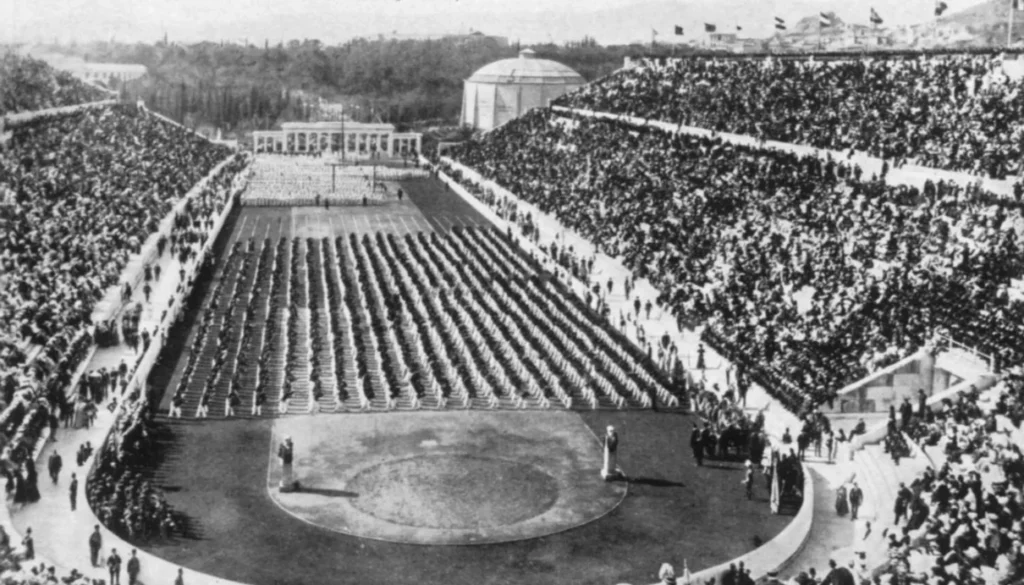
The Evolution of Running Shoes
From barefoot to carbon fiber. The journey is remarkable.
- Pre-1900s: Barefoot or thin leather sandals (like the ancient Greek krepis).
- 1920s-1960s: Basic canvas or leather shoes with rubber soles (e.g., Adidas’ early spikes).
- 1970s: Bill Bowerman’s Nike Waffle Trainer (invented using his wife’s waffle iron) introduced modern cushioning.
- 1980s-2000s: Era of maximal cushioning and motion control (e.g., the Nike Air Max 1 in 1987).
- 2010s: The “minimalist/barefoot” movement sparked by Christopher McDougall’s “Born to Run” (2009).
- 2020s: Carbon fiber plate technology (Nike Alphafly, Adidas Adizero Adios Pro, Saucony Endorphin Elite) and super foams (PEBAX) that improve running economy by 4-5%.
Training Methods & Coaching Science
Training evolved from guesswork to data science. Arthur Lydiard’s periodization in the 1960s. Jack Daniels’ VDOT O2 system in the 1990s. Today, apps like Strava, TrainingPeaks, and WHOOP 5.0 use algorithms to personalize plans. Interval training is now optimized with real-time lactate threshold data from devices like the Garmin HRM-Pro Plus strap.
Running in the 21st Century: A Global Phenomenon
The numbers tell the story. A 2025 report by the Sports & Fitness Industry Association (SFIA) found over 60 million Americans ran at least once in the past year. Virtual races via platforms like RunSignUp and the Conqueror Challenge exploded during the pandemic and remain popular. Social running clubs like November Project and Black Girls RUN! build community. The goals are diverse: weight loss, mental health, competition, or connection.
✨ Elite Performance in 2026
World records continue to fall. Kelvin Kiptum’s marathon WR (2:00:35, 2023) and Faith Kipyegon’s 1500m WR (3:49.11, 2023) showcase the limits of human potential, aided by technology, nutrition, and specialized strength training.
Evolution and Biomechanics of Human Running
The evolution of bipedal locomotion marked a pivotal moment in human history, occurring approximately 4-7 million years ago. While running wasn’t “invented” in the traditional sense, the development of human running biomechanics distinguished our ancestors from other primates.
Early hominids developed unique anatomical features including longer legs, shorter arms, and specialized foot arch structures that enabled efficient running gait patterns. The Achilles tendon, plantar fascia, and gluteus maximus evolved specifically to support endurance running, making humans exceptional persistence hunters capable of outrunning prey over long distances through superior thermoregulation and energy efficiency.
Modern Running Revolution and Technological Advancement
The modern running movement experienced a dramatic transformation in the 20th century. The publication of “Jogging” by Bill Bowerman in 1967 sparked the recreational running boom in America, transforming running from a competitive sport to a mainstream fitness activity.
The development of cushioned running shoes by companies like Nike and Adidas revolutionized running footwear technology, though recent barefoot running and minimalist shoe movements have questioned these innovations.
Scientific advances in running form analysis, gait biomechanics, and sports physiology have optimized training methods, while GPS watches, heart rate monitors, and running apps have made performance tracking accessible to everyday runners.
Running Techniques Through History
Running techniques and training methods have evolved significantly throughout history. Ancient Greek runners practiced interval training methods surprisingly similar to modern HIIT workouts. The Lydiard method, developed in the 1960s, introduced aerobic base building and periodization to distance running.
Sprinting techniques evolved from the crouch start introduction in 1887 to today’s biomechanically optimized starting blocks and form. Understanding the forefoot strike versus heel strike debate, cadence optimization, and breathing techniques helps modern runners apply centuries of accumulated knowledge. The evolution from natural running surfaces to synthetic tracks and treadmills has also influenced technique development and injury patterns.
The Science and Future of Running
Contemporary exercise science and sports medicine have revealed fascinating insights about running’s impact on human physiology. Research on VO2 max, lactate threshold, and running economy has refined training approaches for everyone from casual joggers to elite marathoners.
The discovery of the “runner’s high” phenomenon, linked to endorphin release and endocannabinoid production, explains running’s psychological benefits. Looking forward, innovations in wearable technology, biomechanical analysis, and personalized training algorithms promise to further optimize running performance.
Understanding running’s evolutionary origins helps us appreciate why this fundamental human movement continues to captivate millions worldwide, from 5K races to ultramarathons.
Health Benefits of Running: Insights into the History and Inventions of Running
Cardiovascular Health +
Running strengthens your heart and improves circulation. Regular runners have 45% lower risk of cardiovascular disease and can lower blood pressure by 5-10 mm Hg. Just 30 minutes of running 3 times a week can significantly improve heart health.
Mental Health Benefits +
Running triggers the release of endorphins, creating the famous “runner’s high.” Studies show that regular running can reduce symptoms of depression by up to 30% and anxiety by 20%. It also improves sleep quality and reduces stress hormones like cortisol.
Weight Management +
Running is one of the most efficient calorie-burning exercises, with a 150-pound person burning approximately 100 calories per mile. Regular runners maintain healthier body composition and have lower rates of obesity. Running also boosts metabolism for hours after your workout.
Bone and Joint Health +
Contrary to popular belief, running strengthens bones and joints when done properly. Weight-bearing exercise like running increases bone density by 3-5% over time, reducing risk of osteoporosis. Studies show runners have lower rates of arthritis than non-runners as they age.
Longevity +
Research shows that runners live 3-5 years longer on average than non-runners. Even just 5-10 minutes of running per day is associated with markedly reduced risks of death from all causes and cardiovascular disease. Regular runners show biological markers of people 10 years younger than their chronological age.
FAQs
1. When did humans start running?
Humans began running around two million years ago as a survival skill for hunting, scavenging, and escaping predators, not as a sport.
2. Who invented running?
No one person invented running; it developed naturally as humans evolved to move efficiently on two legs over long distances.
3. When did running become an organized sport?
Running became an organized sport in ancient religious festivals and games, with formal races recorded as early as Bronze Age Ireland and ancient Greece.
4. Why is ancient Greece so important in the history of running?
Ancient Greece formalized running as a prestige event in the Olympic Games, starting in 776 BCE with the stadion footrace as the headline competition.
5. What were the first recorded running competitions?
Early recorded competitions include the Tailteann Games in Ireland and footraces in Greek, Egyptian, and other religious festivals.
6. How did the first Olympic running events work?
The earliest Olympic Games featured short footraces in a straight stadium track, later adding longer distances and multi-lap events as interest grew.
7. How did running evolve from ritual to modern sport?
Running shifted from ritual and military training to professional footracing, then to standardized track, road, and marathon events in the modern Olympic era.
8. What was pedestrianism and why does it matter?
Pedestrianism was 18th–19th century professional walking and running for prize money and bets, acting as a bridge between traditional contests and modern endurance racing.
Conclusion
Running has progressed from a primal survival tool to a defining human sport and health habit, powered by unique anatomical adaptations that make people unusually strong endurance runners. Understanding this long arc—from early hominins and ancient Greek stadium races to modern marathons and everyday joggers—shows that running is not just exercise, but a central thread in human evolution, culture, and longevity-focused fitness.
References
- Berkeley – The evolutionary history of jogging: https://evolution.berkeley.edu/evo-news/the-evolutionary-history-of-jogging/
- Jamestrodgers.com – When was running invented? The complete evolution: https://jamestrodgers.com/when-was-running-invented
- Rockay – The history of running: https://rockay.com/blogs/blog/the-history-of-running-a-brief-introduction
- Nottingham Physio – Running through time: https://nottinghamphysio.com/running-through-time-how-human-evolution-shaped-the-sport/
- PMC – Evolutionary basis of human running: https://pmc.ncbi.nlm.nih.gov/articles/PMC4939291/
- Nature – Humans evolved for distance running: https://www.nature.com/articles/d41586-024-04194-4
- Red Bull – The history of running: https://www.redbull.com/au-en/the-history-of-running
- Runners World – Benefits of running: https://www.runnersworld.com/beginner/a20847956/benefits-of-running/
